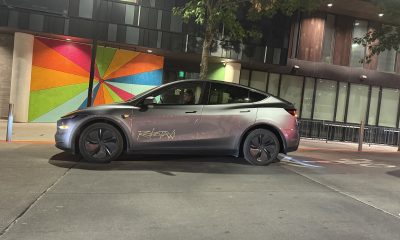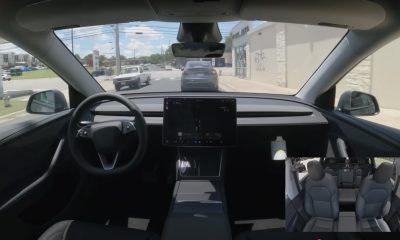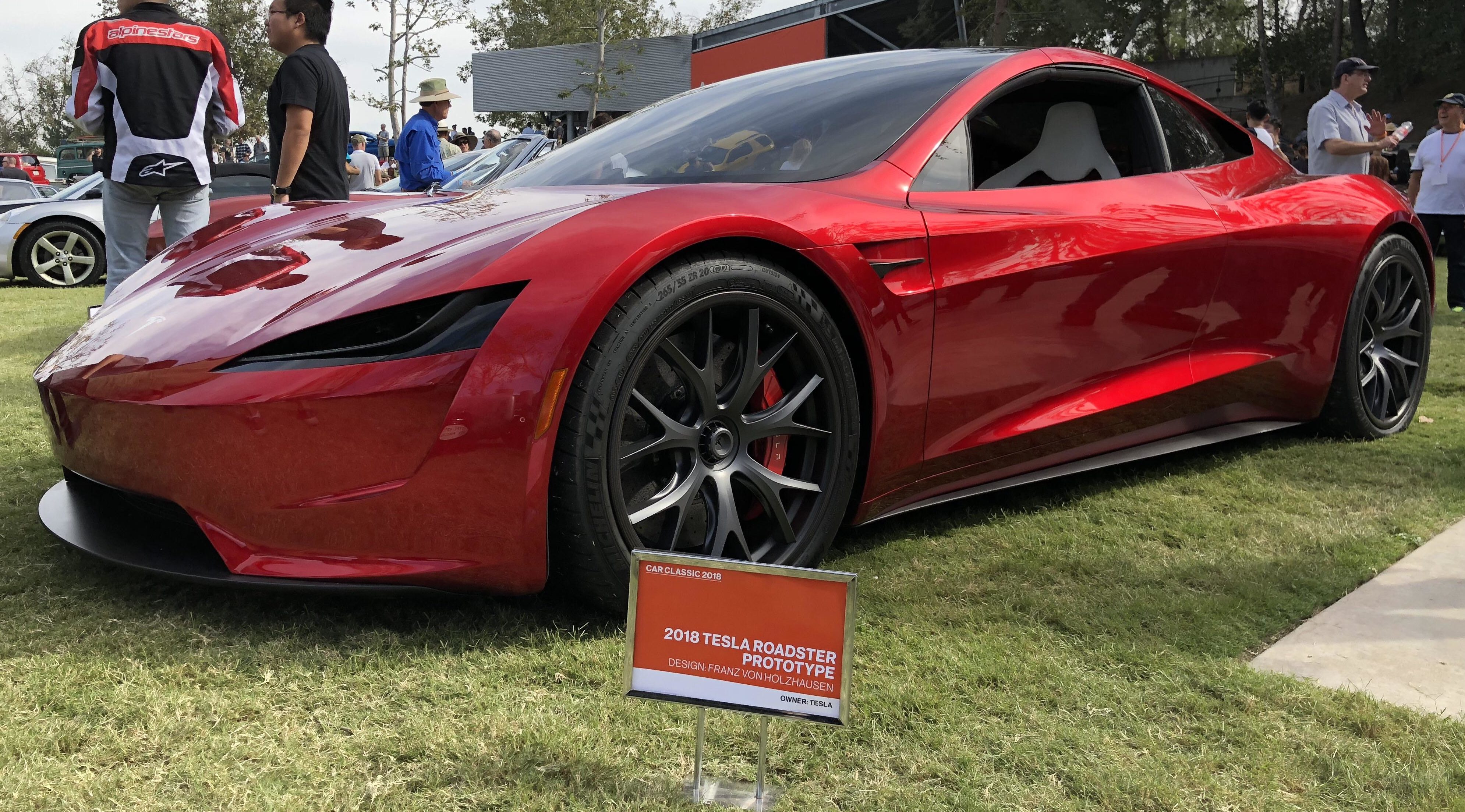

Lifestyle
Should Tesla have ended its Referral Program?
Tesla’s long-running and generous referral program came to an end on February 2, with CEO Elon Musk citing too much cost to the company’s vehicles, especially the Model 3. The system that rewarded so many with so much was finally concluded, but should it have been?
Teslanomics host and Tesla owner-enthusiast Ben Sullins noted in a recent video that the electric carmaker maybe – just maybe – made the wrong decision when it retired its referral program. Tesla’s referral program actually compares favorably to initiatives of other carmakers like General Motors when it comes to return of investment, notes Ben in his analysis. Case in point: GM spent around $3.24 billion in advertising in 2017 versus its auto revenue of $146 billion during the year. This translates to a 45x ROI, meaning that for every dollar the automaker spent on advertising, GM got $45 in revenue.
Tesla, on the other hand, has not released the actual costs of the referral program, but considering the price of the approximately 160 free next-gen Roadsters that Tesla will give out, the Teslanomics host estimates the program to have cost Tesla around $32 million, at least considering the costs associated with the program’s most prolific prize. Compared with the $17.63 billion in auto revenue that Tesla reported for 2018 in its recent Update Letter, the company’s $32 million cost for the free Roadsters actually gives a healthy 550x ROI. This means that for every dollar Tesla spent on the referral program’s largest prize, the company received $550 back in return.
Ben also noted that among automakers in the United States, Tesla is among the ones with the least advertising spending per vehicle sold, at just around $106. This is lower than Porsche’s $161 advertising spending per car, and far below Volkswagen’s $1,211 spending per vehicle sold.
Ultimately, the Tesla owner-enthusiast concluded that it would probably be best for the electric car maker to bring back its referral program, though in a more balanced form. This would actually be a pretty good idea, considering that the story of Tesla’s referral system is a classic tale of a good idea that eventually became unsustainable in the face of growth. A great way to illustrate this would probably be a poll that Teslarati ran after Elon Musk’s announcement last month. Based on the results of our poll, the majority of voters were actually on board with the referral program’s retirement.
Tesla’s Referral Program is coming to an end …
— TESLARATI (@Teslarati) January 19, 2019
It should be noted that Ben and other social media influencers have helped spearhead tremendous word-of-mouth sales for Tesla, while also leveraging their following as a way to gain the necessary referrals to win the upcoming supercar. Some twice. Apart from this, the Teslanomics host’s computations for the rewards system only includes the price of the Roadster and doesn’t take into account other factors connected to the program, such as logistics, developments costs, and other time value costs involved in the production and fulfillment of prizes.
It would be easy to point fingers at who or what is really responsible for the end of Tesla’s generous referral program. It could be influencers who utilized their platforms of choice to refer dozens or even hundreds of new customers. It could also be the Model 3 owners, whose lower-margin vehicles practically flooded the system, rendering it unsustainable. Overall, the fall of the referral program is simply due to Tesla’s inability to balance its rewards system. Perhaps capping the prizes at a point (stopping at one Roadster would have been a great idea, or giving lower-tier prizes for lower-margin vehicles) would have solved the issue. Nevertheless, it would be up to Tesla now if it decides to roll out a similar, more balanced program in the near future.
Watch Ben Sullins’ take on the retirement of Tesla’s referral program in the video below.
Elon Musk
X account with 184 followers inadvertently saves US space program amid Musk-Trump row
Needless to say, the X user has far more than 184 followers today after his level-headed feat.
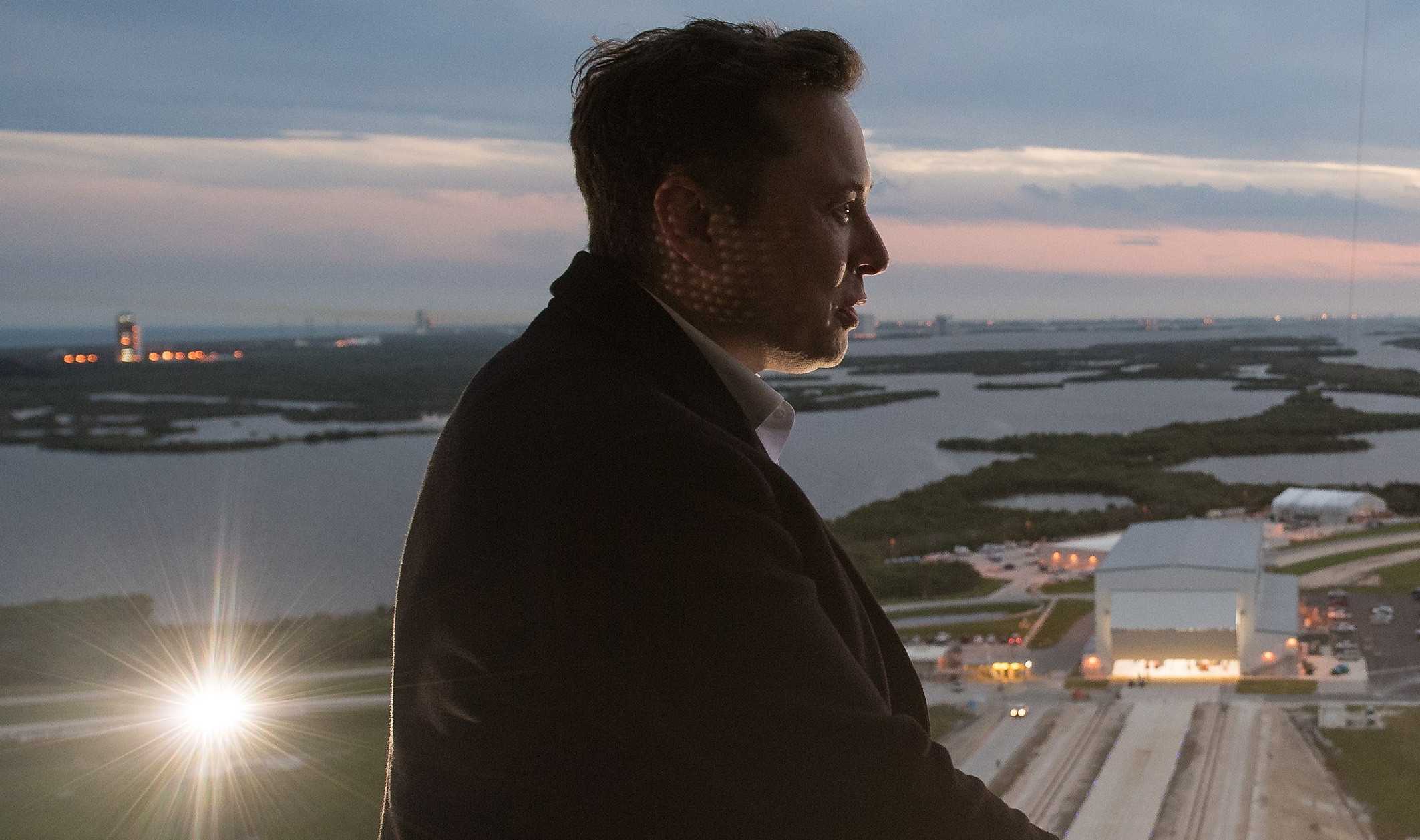
An X user with 184 followers has become the unlikely hero of the United States’ space program by effectively de-escalating a row between SpaceX CEO Elon Musk and President Donald Trump on social media.
Needless to say, the X user has far more than 184 followers today after his level-headed feat.
A Near Fall
During Elon Musk and Donald Trump’s fallout last week, the U.S. President stated in a post on Truth Social that a good way for the United States government to save money would be to terminate subsidies and contracts from the CEO’s companies. Musk responded to Trump’s post by stating that SpaceX will start decommissioning its Dragon spacecraft immediately.
Musk’s comment was received with shock among the space community, partly because the U.S. space program is currently reliant on SpaceX to send supplies and astronauts to the International Space Station (ISS). Without Dragon, the United States will likely have to utilize Russia’s Soyuz for the same services—at a significantly higher price.
X User to the Rescue
It was evident among X users that Musk’s comments about Dragon being decommissioned were posted while emotions were high. It was then no surprise that an X account with 184 followers, @Fab25june, commented on Musk’s post, urging the CEO to rethink his decision. “This is a shame this back and forth. You are both better than this. Cool off and take a step back for a couple days,” the X user wrote in a reply.
Much to the social media platform’s surprise, Musk responded to the user. Even more surprising, the CEO stated that SpaceX would not be decommissioning Dragon after all. “Good advice. Ok, we won’t decommission Dragon,” Musk wrote in a post on X.
Not Planned, But Welcomed
The X user’s comment and Musk’s response were received extremely well by social media users, many of whom noted that @Fab25june’s X comment effectively saved the U.S. space program. In a follow-up comment, the X user, who has over 9,100 followers as of writing, stated that he did not really plan on being a mediator between Musk and Trump.
“Elon Musk replied to me. Somehow, I became the accidental peace broker between two billionaires. I didn’t plan this. I was just being me. Two great minds can do wonders. Sometimes, all it takes is a breather. Grateful for every like, DM, and new follow. Life’s weird. The internet’s weirder. Let’s ride. (Manifesting peace… and maybe a Model Y.)” the X user wrote.
Lifestyle
Tesla Cybertruck takes a bump from epic failing Dodge Charger
The Cybertruck seemed unharmed by the charging Charger.
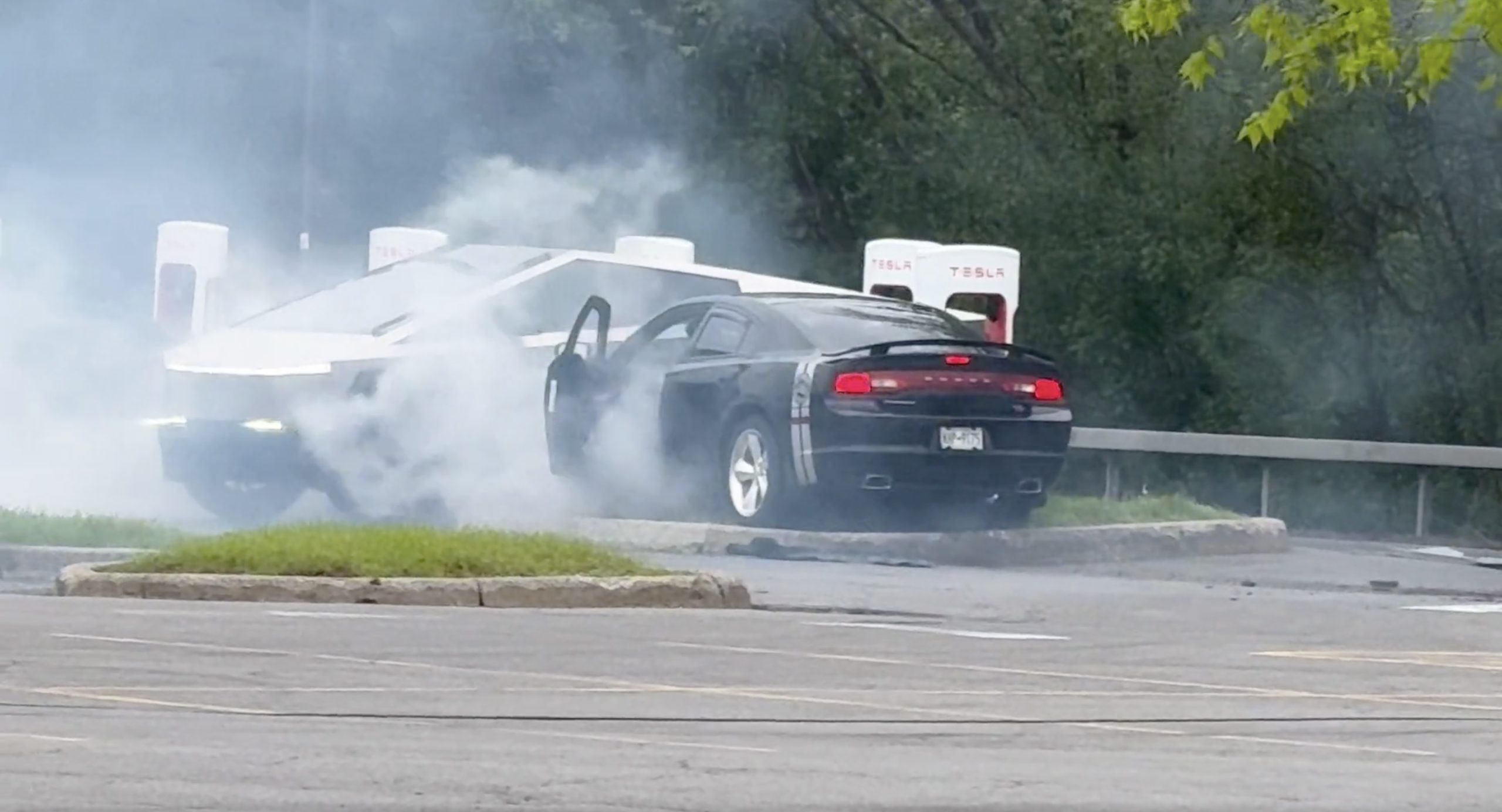
There comes a time in a driver’s life when one is faced with one’s limitations. For the driver of a Dodge Charger, this time came when he lost control and crashed into a Tesla Cybertruck–an absolute epic fail.
A video of the rather unfortunate incident was shared on the r/TeslaLounge subreddit.
Charging Charger Fails
As could be seen in the video, which was posted on the subreddit by Model Y owner u/Hammer_of_something, a group of teens in a Dodge Charger decided to do some burnouts at a Tesla Supercharger. Unfortunately, the driver of the Charger failed in his burnout or donut attempt, resulting in the mopar sedan going over a curb and bumping a charging Cybertruck.
Ironically, the Dodge Charger seemed to have been parked at a Supercharger stall before its driver decided to perform the failed stunt. This suggests that the vehicle was likely ICE-ing a charging stall before it had its epic fail moment. Amusingly enough, the subreddit member noted that the Cybertruck did not seem like it took any damage at all despite its bump. The Charger, however, seemed like it ran into some trouble after crashing into the truck.
Alleged Aftermath
As per the the r/TeslaLounge subreddit member, the Cybertruck owner came rushing out to his vehicle after the Dodge Charger crashed into it. The Model Y owner then sent over the full video of the incident, which clearly showed the Charger attempting a burnout, failing, and bumping into the Cybertruck. The Cybertruck owner likely appreciated the video, in part because it showed the driver of the Dodge Charger absolutely freaking out after the incident.
The Cybertruck is not an impregnable vehicle, but it can take bumps pretty well thanks to its thick stainless steel body. Based on this video, it appears that the Cybertruck can even take bumps from a charging Charger, all while chilling and charging at a Supercharger. As for the teens in the Dodge, they likely had to provide a long explanation to authorities after the incident, since the cops were called to the location.
Lifestyle
Anti-Elon Musk group crushes Tesla Model 3 with Sherman tank–with unexpected results
Ironically enough, the group’s video ended up highlighting something very positive for Tesla.
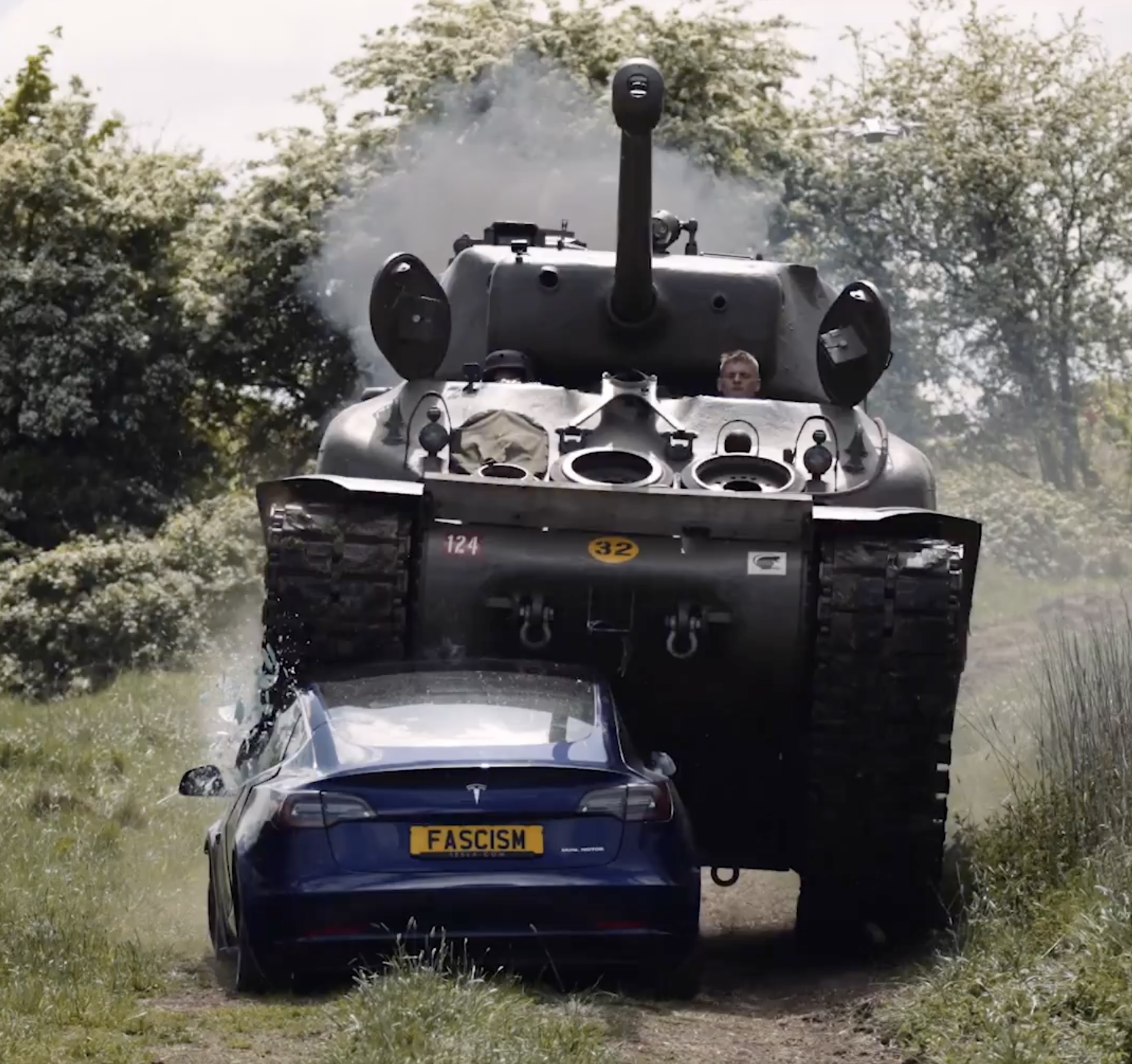
Anti-Elon Musk protesters and critics tend to show their disdain for the CEO in various ways, but a recent video from political action group Led By Donkeys definitely takes the cake when it comes to creativity.
Ironially enough, the group’s video also ended up highlighting something very positive for Tesla.
Tank vs. Tesla
In its video, Led By Donkeys featured Ken Turner, a 98-year-old veteran who served in the British army during World War II. The veteran stated that Elon Musk, the richest man in the world, is “using his immense power to support the far-right in Europe, and his money comes from Tesla cars.”
He also noted that he had a message for the Tesla CEO: “We’ve crushed fascism before and we’ll crush it again.” To emphasize his point, the veteran proceeded to drive a Sherman tank over a blue Tesla Model 3 sedan, which, of course, had a plate that read “Fascism.”
The heavy tank crushed the Model 3’s glass roof and windows, much to the delight of Led By Donkeys’ commenters on its official YouTube channel. But at the end of it all, the aftermath of the anti-Elon Musk demonstration ended up showcasing something positive for the electric vehicle maker.
Tesla Model 3 Tanks the Tank?
As could be seen from the wreckage of the Tesla Model 3 after its Sherman encounter, only the glass roof and windows of the all-electric sedan were crushed. Looking at the wreckage of the Model 3, it seemed like its doors could still be opened, and everything on its lower section looked intact.
Considering that a standard M4 Sherman weighs about 66,800 to 84,000 pounds, the Model 3 actually weathered the tank’s assault really well. Granted, the vehicle’s suspension height before the political action group’s demonstration suggests that the Model 3’s high voltage battery had been removed beforehand. But even if it hadn’t been taken off, it seemed like the vehicle’s battery would have survived the heavy ordeal without much incident.
This was highlighted in comments from users on social media platform X, many of whom noted that a person in the Model 3 could very well have survived the ordeal with the Sherman. And that, ultimately, just speaks to the safety of Tesla’s vehicles. There is a reason why Teslas consistently rank among the safest cars on the road, after all.
-

 News5 days ago
News5 days agoTesla Robotaxi’s biggest challenge seems to be this one thing
-

 News2 weeks ago
News2 weeks agoTesla confirms massive hardware change for autonomy improvement
-

 Elon Musk2 weeks ago
Elon Musk2 weeks agoElon Musk slams Bloomberg’s shocking xAI cash burn claims
-

 News2 weeks ago
News2 weeks agoTesla features used to flunk 16-year-old’s driver license test
-

 News2 weeks ago
News2 weeks agoTesla China roars back with highest vehicle registrations this Q2 so far
-

 News2 weeks ago
News2 weeks agoTexas lawmakers urge Tesla to delay Austin robotaxi launch to September
-

 News2 weeks ago
News2 weeks agoTesla dominates Cars.com’s Made in America Index with clean sweep
-

 News2 weeks ago
News2 weeks agoTesla’s Grok integration will be more realistic with this cool feature






